CHEVROLET CAPTIVA SPORT 2013 Service Manual
Manufacturer: CHEVROLET, Model Year: 2013, Model line: CAPTIVA SPORT, Model: CHEVROLET CAPTIVA SPORT 2013Pages: 374, PDF Size: 6.66 MB
Page 41 of 374
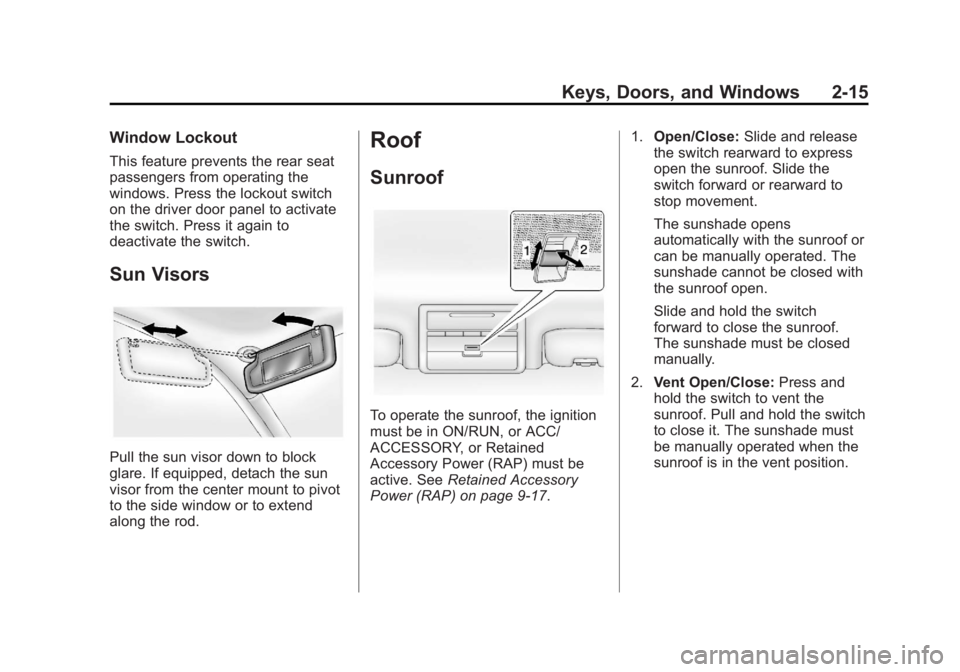
Black plate (15,1)Chevrolet Captiva Sport Owner Manual - 2013 - crc - 11/12/12
Keys, Doors, and Windows 2-15Window Lockout This feature prevents the rear seat
passengers from operating the
windows. Press the lockout switch
on the driver door panel to activate
the switch. Press it again to
deactivate the switch.
Sun Visors
Pull the sun visor down to block
glare. If equipped, detach the sun
visor from the center mount to pivot
to the side window or to extend
along the rod. Roof Sunroof
To operate the sunroof, the ignition
must be in ON/RUN, or ACC/
ACCESSORY, or Retained
Accessory Power (RAP) must be
active. See Retained Accessory
Power (RAP) on page 9 ‑ 17 . 1. Open/Close: Slide and release
the switch rearward to express
open the sunroof. Slide the
switch forward or rearward to
stop movement.
The sunshade opens
automatically with the sunroof or
can be manually operated. The
sunshade cannot be closed with
the sunroof open.
Slide and hold the switch
forward to close the sunroof.
The sunshade must be closed
manually.
2. Vent Open/Close: Press and
hold the switch to vent the
sunroof. Pull and hold the switch
to close it. The sunshade must
be manually operated when the
sunroof is in the vent position.
Page 42 of 374
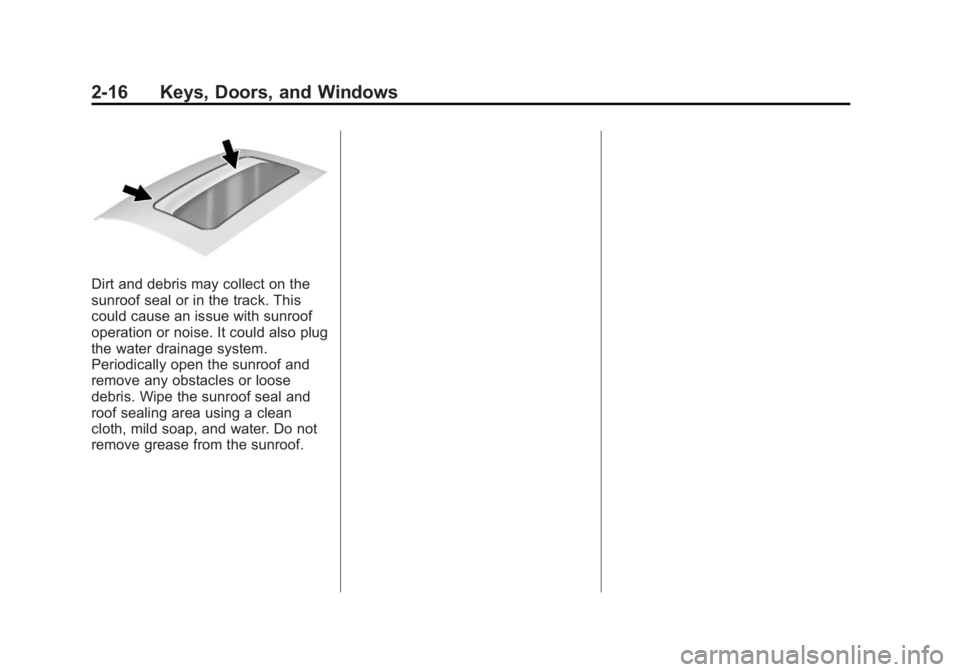
Black plate (16,1)Chevrolet Captiva Sport Owner Manual - 2013 - crc - 11/12/12
2-16 Keys, Doors, and Windows
Dirt and debris may collect on the
sunroof seal or in the track. This
could cause an issue with sunroof
operation or noise. It could also plug
the water drainage system.
Periodically open the sunroof and
remove any obstacles or loose
debris. Wipe the sunroof seal and
roof sealing area using a clean
cloth, mild soap, and water. Do not
remove grease from the sunroof.
Page 43 of 374
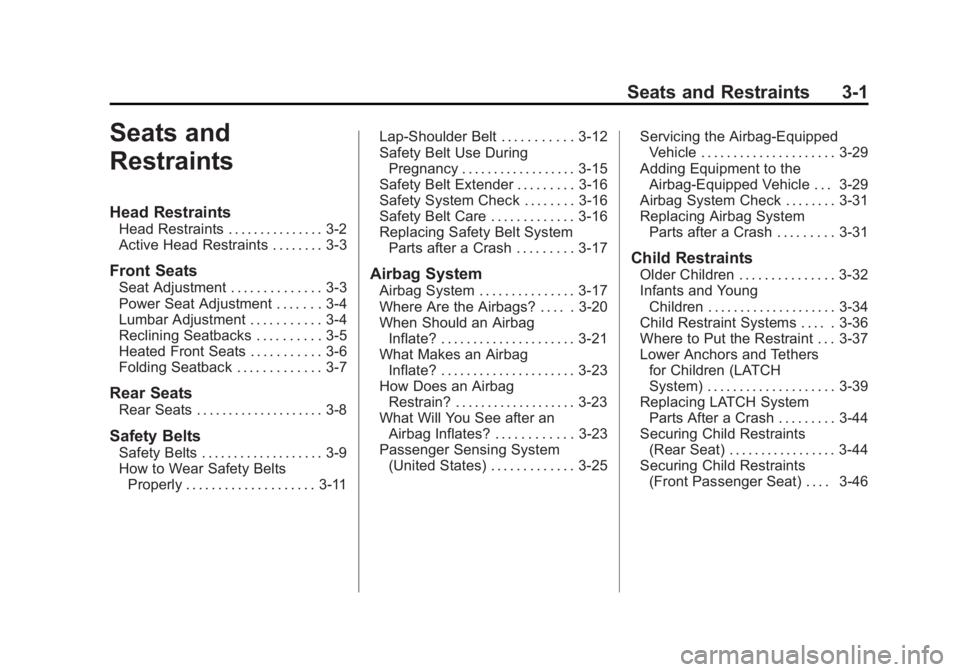
Black plate (1,1)Chevrolet Captiva Sport Owner Manual - 2013 - crc - 11/12/12
Seats and Restraints 3-1
Seats and
Restraints Head Restraints Head Restraints . . . . . . . . . . . . . . . 3-2
Active Head Restraints . . . . . . . . 3-3
Front Seats Seat Adjustment . . . . . . . . . . . . . . 3-3
Power Seat Adjustment . . . . . . . 3-4
Lumbar Adjustment . . . . . . . . . . . 3-4
Reclining Seatbacks . . . . . . . . . . 3-5
Heated Front Seats . . . . . . . . . . . 3-6
Folding Seatback . . . . . . . . . . . . . 3-7
Rear Seats Rear Seats . . . . . . . . . . . . . . . . . . . . 3-8
Safety Belts Safety Belts . . . . . . . . . . . . . . . . . . . 3-9
How to Wear Safety Belts
Properly . . . . . . . . . . . . . . . . . . . . 3-11 Lap-Shoulder Belt . . . . . . . . . . . 3-12
Safety Belt Use During
Pregnancy . . . . . . . . . . . . . . . . . . 3-15
Safety Belt Extender . . . . . . . . . 3-16
Safety System Check . . . . . . . . 3-16
Safety Belt Care . . . . . . . . . . . . . 3-16
Replacing Safety Belt System
Parts after a Crash . . . . . . . . . 3-17
Airbag System Airbag System . . . . . . . . . . . . . . . 3-17
Where Are the Airbags? . . . . . 3-20
When Should an Airbag
Inflate? . . . . . . . . . . . . . . . . . . . . . 3-21
What Makes an Airbag
Inflate? . . . . . . . . . . . . . . . . . . . . . 3-23
How Does an Airbag
Restrain? . . . . . . . . . . . . . . . . . . . 3-23
What Will You See after an
Airbag Inflates? . . . . . . . . . . . . 3-23
Passenger Sensing System
(United States) . . . . . . . . . . . . . 3-25 Servicing the Airbag-Equipped
Vehicle . . . . . . . . . . . . . . . . . . . . . 3-29
Adding Equipment to the
Airbag-Equipped Vehicle . . . 3-29
Airbag System Check . . . . . . . . 3-31
Replacing Airbag System
Parts after a Crash . . . . . . . . . 3-31
Child Restraints Older Children . . . . . . . . . . . . . . . 3-32
Infants and Young
Children . . . . . . . . . . . . . . . . . . . . 3-34
Child Restraint Systems . . . . . 3-36
Where to Put the Restraint . . . 3-37
Lower Anchors and Tethers
for Children (LATCH
System) . . . . . . . . . . . . . . . . . . . . 3-39
Replacing LATCH System
Parts After a Crash . . . . . . . . . 3-44
Securing Child Restraints
(Rear Seat) . . . . . . . . . . . . . . . . . 3-44
Securing Child Restraints
(Front Passenger Seat) . . . . 3-46
Page 44 of 374
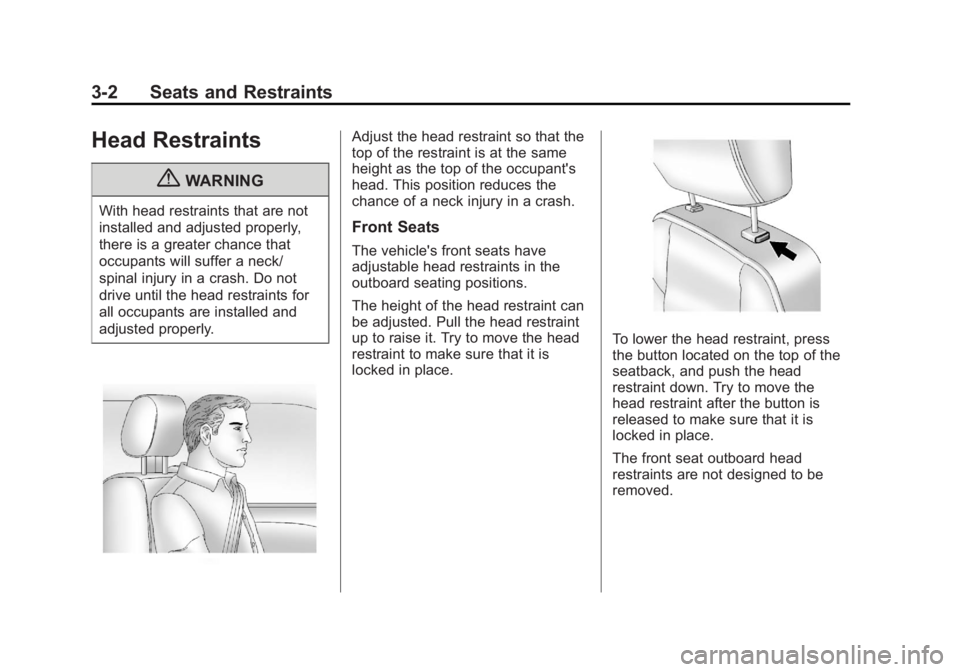
Black plate (2,1)Chevrolet Captiva Sport Owner Manual - 2013 - crc - 11/12/12
3-2 Seats and Restraints
Head Restraints
{ WARNINGWith head restraints that are not
installed and adjusted properly,
there is a greater chance that
occupants will suffer a neck/
spinal injury in a crash. Do not
drive until the head restraints for
all occupants are installed and
adjusted properly. Adjust the head restraint so that the
top of the restraint is at the same
height as the top of the occupant's
head. This position reduces the
chance of a neck injury in a crash.
Front Seats The vehicle's front seats have
adjustable head restraints in the
outboard seating positions.
The height of the head restraint can
be adjusted. Pull the head restraint
up to raise it. Try to move the head
restraint to make sure that it is
locked in place. To lower the head restraint, press
the button located on the top of the
seatback, and push the head
restraint down. Try to move the
head restraint after the button is
released to make sure that it is
locked in place.
The front seat outboard head
restraints are not designed to be
removed.
Page 45 of 374
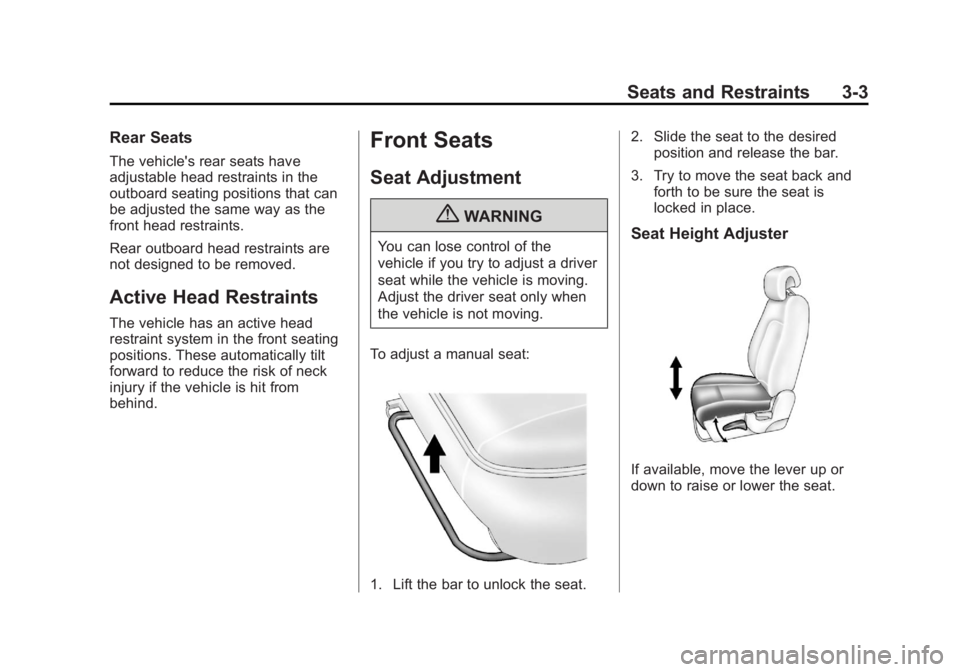
Black plate (3,1)Chevrolet Captiva Sport Owner Manual - 2013 - crc - 11/12/12
Seats and Restraints 3-3Rear Seats The vehicle's rear seats have
adjustable head restraints in the
outboard seating positions that can
be adjusted the same way as the
front head restraints.
Rear outboard head restraints are
not designed to be removed.
Active Head Restraints The vehicle has an active head
restraint system in the front seating
positions. These automatically tilt
forward to reduce the risk of neck
injury if the vehicle is hit from
behind. Front Seats Seat Adjustment
{ WARNINGYou can lose control of the
vehicle if you try to adjust a driver
seat while the vehicle is moving.
Adjust the driver seat only when
the vehicle is not moving.
To adjust a manual seat:
1. Lift the bar to unlock the seat. 2. Slide the seat to the desired
position and release the bar.
3. Try to move the seat back and
forth to be sure the seat is
locked in place.
Seat Height Adjuster
If available, move the lever up or
down to raise or lower the seat.
Page 46 of 374
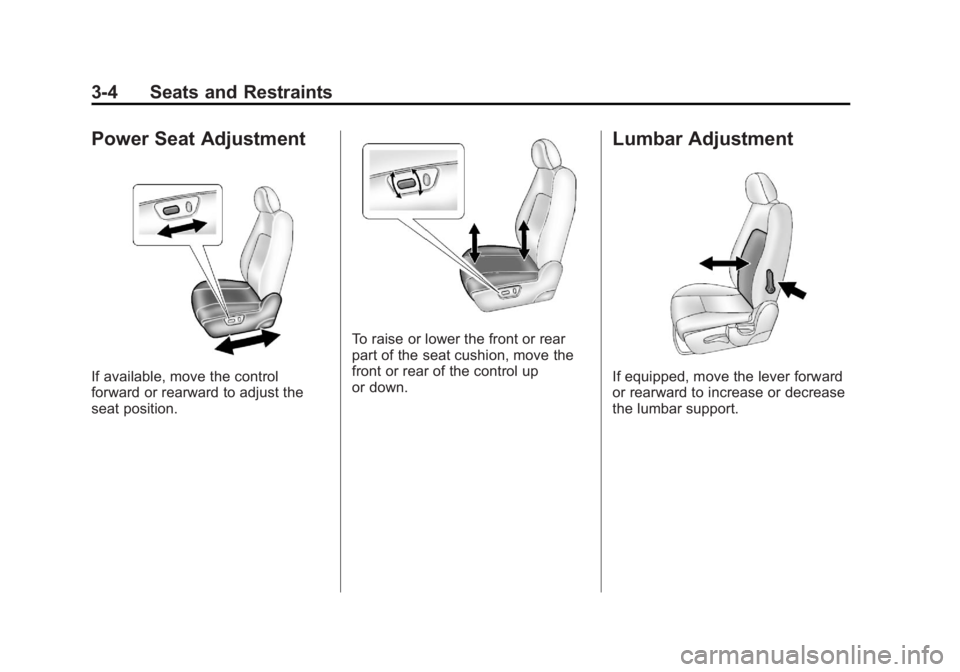
Black plate (4,1)Chevrolet Captiva Sport Owner Manual - 2013 - crc - 11/12/12
3-4 Seats and Restraints
Power Seat Adjustment
If available, move the control
forward or rearward to adjust the
seat position. To raise or lower the front or rear
part of the seat cushion, move the
front or rear of the control up
or down. Lumbar Adjustment
If equipped, move the lever forward
or rearward to increase or decrease
the lumbar support.
Page 47 of 374
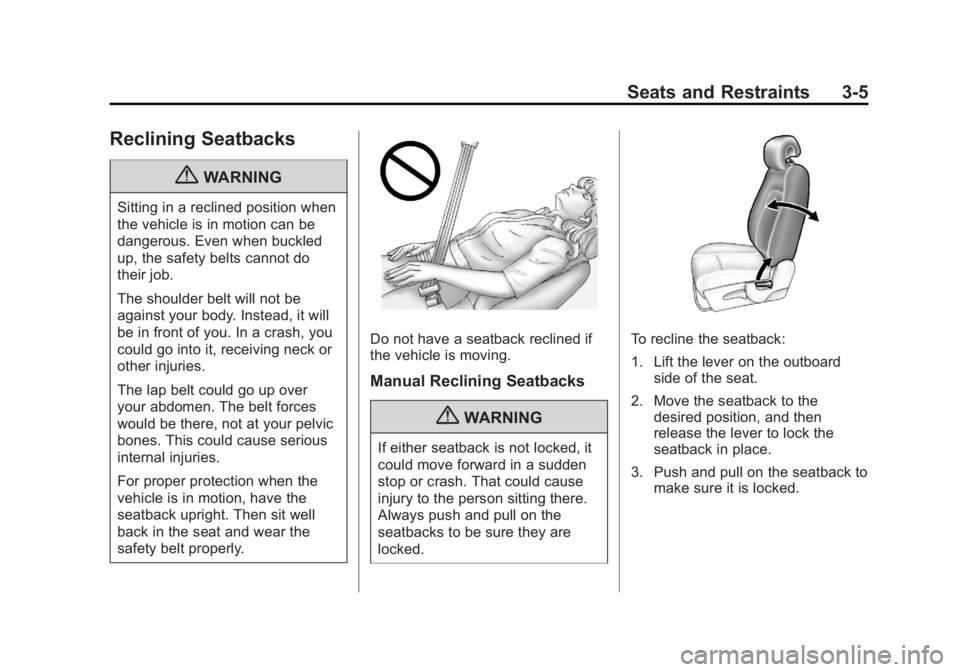
Black plate (5,1)Chevrolet Captiva Sport Owner Manual - 2013 - crc - 11/12/12
Seats and Restraints 3-5
Reclining Seatbacks
{ WARNINGSitting in a reclined position when
the vehicle is in motion can be
dangerous. Even when buckled
up, the safety belts cannot do
their job.
The shoulder belt will not be
against your body. Instead, it will
be in front of you. In a crash, you
could go into it, receiving neck or
other injuries.
The lap belt could go up over
your abdomen. The belt forces
would be there, not at your pelvic
bones. This could cause serious
internal injuries.
For proper protection when the
vehicle is in motion, have the
seatback upright. Then sit well
back in the seat and wear the
safety belt properly. Do not have a seatback reclined if
the vehicle is moving.
Manual Reclining Seatbacks
{ WARNING
If either seatback is not locked, it
could move forward in a sudden
stop or crash. That could cause
injury to the person sitting there.
Always push and pull on the
seatbacks to be sure they are
locked. To recline the seatback:
1. Lift the lever on the outboard
side of the seat.
2. Move the seatback to the
desired position, and then
release the lever to lock the
seatback in place.
3. Push and pull on the seatback to
make sure it is locked.
Page 48 of 374
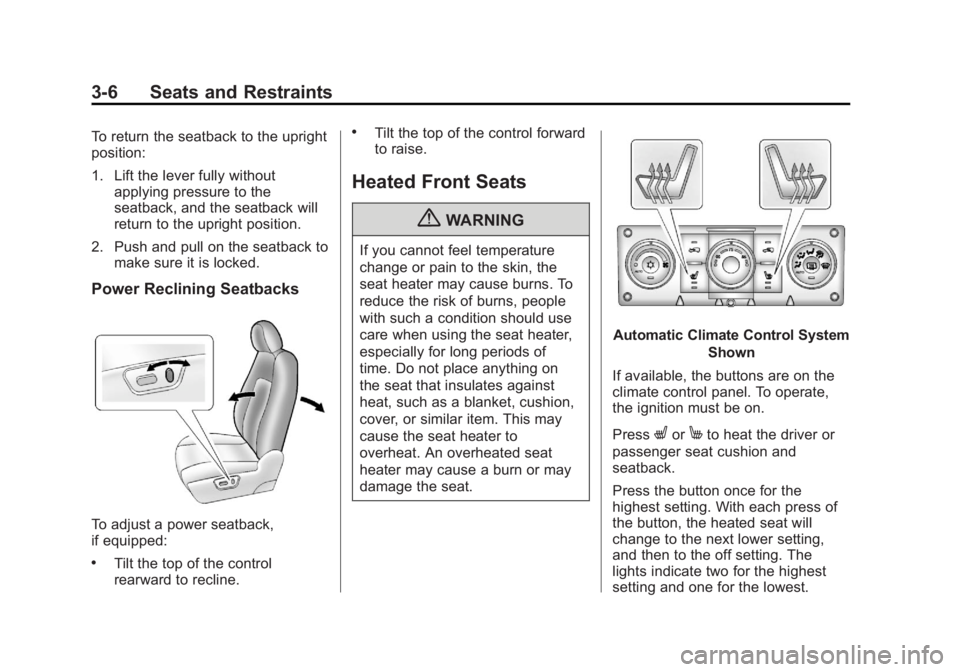
Black plate (6,1)Chevrolet Captiva Sport Owner Manual - 2013 - crc - 11/12/12
3-6 Seats and Restraints To return the seatback to the upright
position:
1. Lift the lever fully without
applying pressure to the
seatback, and the seatback will
return to the upright position.
2. Push and pull on the seatback to
make sure it is locked.
Power Reclining Seatbacks
To adjust a power seatback,
if equipped: .
Tilt the top of the control
rearward to recline. .
Tilt the top of the control forward
to raise.
Heated Front Seats
{ WARNINGIf you cannot feel temperature
change or pain to the skin, the
seat heater may cause burns. To
reduce the risk of burns, people
with such a condition should use
care when using the seat heater,
especially for long periods of
time. Do not place anything on
the seat that insulates against
heat, such as a blanket, cushion,
cover, or similar item. This may
cause the seat heater to
overheat. An overheated seat
heater may cause a burn or may
damage the seat. Automatic Climate Control System
Shown
If available, the buttons are on the
climate control panel. To operate,
the ignition must be on.
Press
L or
M to heat the driver or
passenger seat cushion and
seatback.
Press the button once for the
highest setting. With each press of
the button, the heated seat will
change to the next lower setting,
and then to the off setting. The
lights indicate two for the highest
setting and one for the lowest.
Page 49 of 374
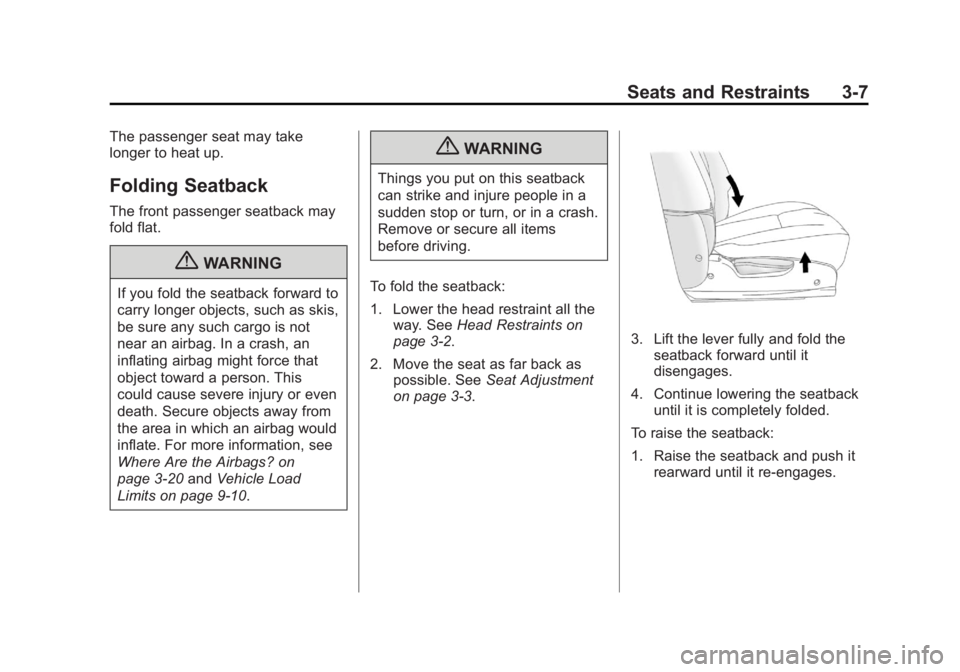
Black plate (7,1)Chevrolet Captiva Sport Owner Manual - 2013 - crc - 11/12/12
Seats and Restraints 3-7The passenger seat may take
longer to heat up.
Folding Seatback The front passenger seatback may
fold flat.
{ WARNINGIf you fold the seatback forward to
carry longer objects, such as skis,
be sure any such cargo is not
near an airbag. In a crash, an
inflating airbag might force that
object toward a person. This
could cause severe injury or even
death. Secure objects away from
the area in which an airbag would
inflate. For more information, see
Where Are the Airbags? on
page 3 ‑ 20 and Vehicle Load
Limits on page 9 ‑ 10 .{ WARNINGThings you put on this seatback
can strike and injure people in a
sudden stop or turn, or in a crash.
Remove or secure all items
before driving.
To fold the seatback:
1. Lower the head restraint all the
way. See Head Restraints on
page 3 ‑ 2 .
2. Move the seat as far back as
possible. See Seat Adjustment
on page 3 ‑ 3 . 3. Lift the lever fully and fold the
seatback forward until it
disengages.
4. Continue lowering the seatback
until it is completely folded.
To raise the seatback:
1. Raise the seatback and push it
rearward until it re-engages.
Page 50 of 374
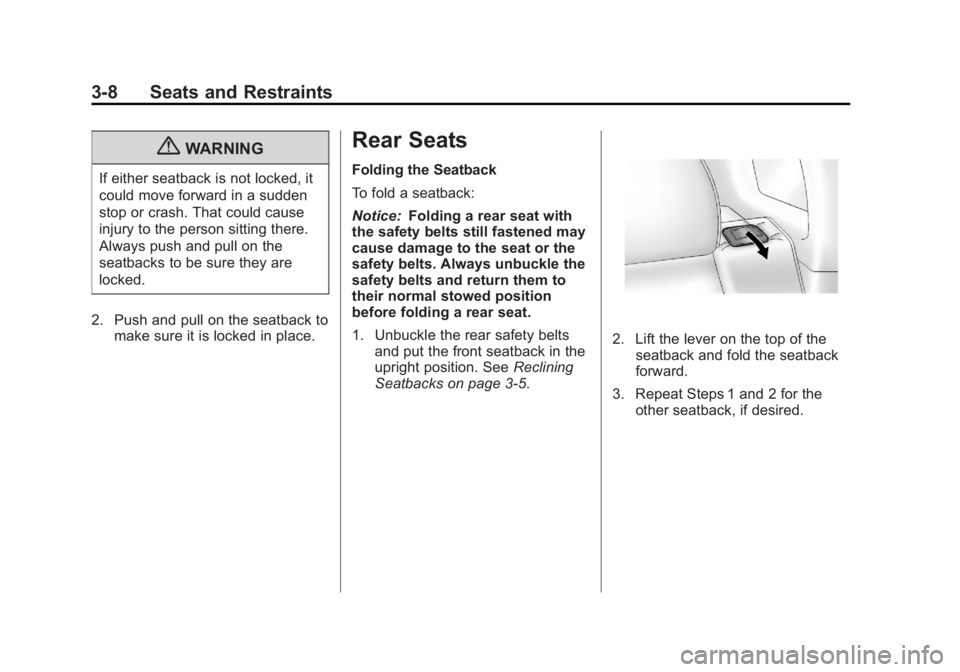
Black plate (8,1)Chevrolet Captiva Sport Owner Manual - 2013 - crc - 11/12/12
3-8 Seats and Restraints
{ WARNINGIf either seatback is not locked, it
could move forward in a sudden
stop or crash. That could cause
injury to the person sitting there.
Always push and pull on the
seatbacks to be sure they are
locked.
2. Push and pull on the seatback to
make sure it is locked in place. Rear Seats Folding the Seatback
To fold a seatback:
Notice: Folding a rear seat with
the safety belts still fastened may
cause damage to the seat or the
safety belts. Always unbuckle the
safety belts and return them to
their normal stowed position
before folding a rear seat.
1. Unbuckle the rear safety belts
and put the front seatback in the
upright position. See Reclining
Seatbacks on page 3 ‑ 5 . 2. Lift the lever on the top of the
seatback and fold the seatback
forward.
3. Repeat Steps 1 and 2 for the
other seatback, if desired.